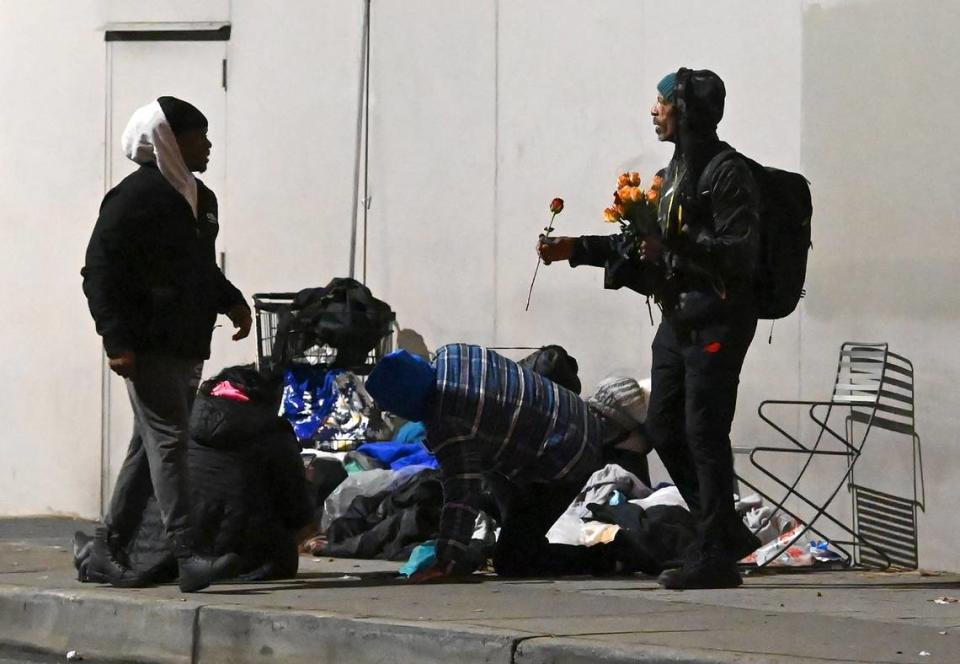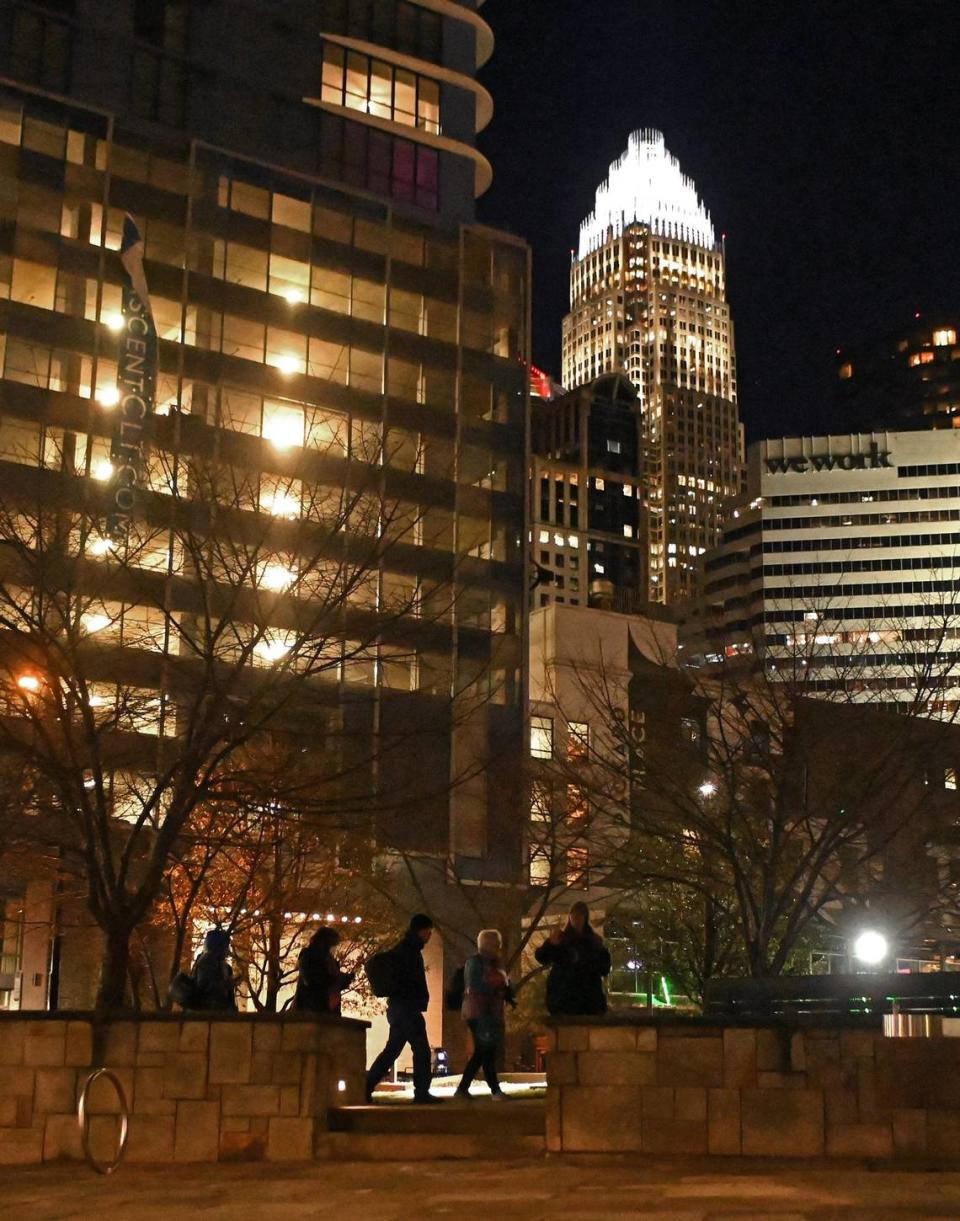Charlotte could OK criminal penalties for 8 acts. Will change target homeless people?
The Charlotte City Council is poised to recriminalize public urination, public masturbation, panhandling and more ordinances, but some community groups say they’ve still got concerns about potential impacts on the city’s most vulnerable.
A vote on the ordinances is scheduled for the council’s meeting today, and safety committee Chairwoman Victoria Watlington said at the council’s discussion last week she “gets the sense” there are enough votes to move forward. A majority of the council’s 11 members would need to vote for the change for it to pass.
At last week’s discussion, multiple council members praised city staff for developing a “holistic” approach to quality of life concerns, especially in uptown, that improves safety and helps people experiencing homelessness get assistance.
“This is a truly comprehensive plan,” at-large member Dimple Ajmera said.
But another council member and prominent community organizations say there’s more work to be done to prevent unintended consequences.
What Charlotte city ordinances are under consideration?
The council’s Housing, Safety and Community Committee voted 3-2 in January to recommend the full council vote on criminalizing eight city ordinances:
Beer and wine consumption, possession of open containers and disposal of containers
Unauthorized people in parking lots
Trespassing in a motor vehicle
Loitering for the purpose of engaging in drug-related activity
Masturbation in public
Urination and defecation on certain property prohibited
Behavior in public parks
Soliciting from street or median strip, which could include panhandling
Charlotte-Mecklenburg Police leadership recommended the ordinances for consideration after uptown residents and business owners in August called on City Council to take action amid what they said was an uptick in nuisance crimes.
A state law decriminalized city ordinances in 2021, which meant officers’ only options when facing people violating the ordinances were to ask for compliance, give a verbal warning or issue a written civil citation. The law allows municipalities to reinstate criminal penalties for some local laws if they vote to do so. The City Council did so previously on seven other local laws in 2022.
Adding back criminal penalties for the ordinances — which would allow officers to issue criminal citations to or arrest people who violate them — would “enhance CMPD’s ability to maintain public safety,” Deputy City Manager Shawn Heath said last week.
However, the ordinances about unauthorized people in parking lots and loitering may need additional examination, city staff said last week, because of concerns about possible legal challenges.
There would still be a “continued emphasis on voluntary compliance,” Heath added, giving officers the discretion to issue a verbal warning instead of or before escalating to a criminal punishment.
‘A moment to seek higher ground’

District 3 council member Tiawana Brown said giving officers so much discretion over how to handle the situations is part of what concerns her about the ordinances, citing past incidents such as the controversial arrest outside a Steele Creek-area Bojangles in November.
Brown, a formerly incarcerated person who runs a nonprofit to help women navigating h the criminal justice system, said she’s also concerned the ordinances will inordinately impact people experiencing homelessness who don’t have safe, regular access to a restroom, a bed and more.
Brown, who voted against the changes in committee, reiterated her opposition at last week’s discussion.
“I still hold true to how I feel about recriminalization. That’s not going to change,” she said.
Brown is not alone in her concerns about the potential impacts of the ordinances.
In a letter sent Feb. 5, Roof Above CEO Liz Clasen-Kelly said, “While the ordinances under consideration do not exclusively relate to homelessness, many are directed at unsheltered homelessness and will certainly disproportionately impact people sleeping outside.”
The current debate presents “a moment to seek higher ground,” she said.
“Charlotte is at its best when we do not lose sight of each other’s humanity,” Clasen-Kelly said. “In this conversation, we must recognize the significant behavioral health and life challenges facing our neighbors in homelessness; we must recognize that our emergency shelter system is operating at capacity; and we must recognize the limits and potential harms of a law-enforcement response to a much deeper issue.”
Charlotte needs to invest more in public bathrooms, street outreach efforts, emergency shelters and affordable housing, she continued, in order to address homelessness and its root causes.
If the council votes in favor of the ordinance changes, Roof Above wants the city to delay enforcement of the public urination/defecation, behavior in public parks, open container and soliciting from the street measures for a year to give groups a chance communicate with people experiencing homelessness.
The group called on supporters to reach out to their council members ahead of today’s vote and attend the meeting.
Robert Dawkins, political director of Action NC and an organizer with the group’s SAFE Coalition, said in a statement his organization understands recriminalizing behaviors such as public masturbation, they have “serious concerns” about the urination and defecation, public intoxication and park behavior ordinance changes.
Dawkins said the city has failed to take action in the past to address the lack of public bathrooms in uptown, especially since the demolition of the old uptown library, and that it’s “problematic” for the council to legislate against open containers while voting in favor of social districts.
Charlotte’s first social district is expected to launch in Plaza Midwood in March.
Dawkins said the city and Mecklenburg County should collaborate to create more public restrooms and that the city should expand its Civilian Assistance Response Engage Support team, which is trained to help people with mental health issues and more, to take a “clinical” approach to quality of life issues over a “criminal” one.
“NC statutes around enforcement of local ordinances offer a remedy for individuals charged in good faith if they are seeking help, and it’s our opinion that clinical referrals from CARES Team vs arrest by CMPD lives up to the spirit of the law,” he said.
‘An integrated model’
At City Council’s discussion last week, city staff members previewed some ways they’re working to address the community’s concerns. Among them: the city works on affordable housing initiatives with Mecklenburg County and puts funds into its Housing Trust Fund, Heal Charlotte, Charlotte Rescue Mission and emergency rental assistance, Heath noted.
The city discussed ways to help that include putting money toward street outreach efforts by Hearts for the Invisible “in tandem” with the CARES team and increasing rental subsidies, including for people experiencing homelessness in uptown, Health said.
On public bathrooms, Heath said Charlotte plans to work with the county to refurbish Hope Vibes’ mobile truck to include two full bathrooms with showers and washers and dryers, fund two new portable toilets at N. College and 11th streets for up to six months and consider purchasing two “PortlandLoo” model standalone bathrooms.
“We’re really trying to build out an integrated model,” Heath said.
City Council debate

Council member Ed Driggs said he doesn’t “think anyone could accuse this council of having a lack of concern for those in difficult circumstances.”
“I don’t believe we are criminalizing poverty or homelessness; we are criminalizing behaviors,” he said, adding that not everyone experiencing homelessness is violating the ordinances and that not all violators are homeless.
Ajmera added that she’s pleased with the “holistic” approach, but she’d like to see the council delay enforcement until March 1 to give outreach groups more time to prepare rather than them taking effect immediately if approved.
“It would be a more humane response,” she said.
Ajmeria added that she’d also like to see the CARES team expand hours and for the city undergo an assessment a year or 18 months after the ordinances take effect to see if they’re having the desired effect.
Want more coverage of Charlotte-area government and politics? Subscribe here for free to the Observer’s weekly CLT Politics newsletter and never miss a story

